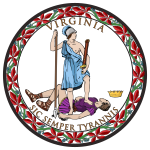This article needs additional citations for verification. (August 2009) |
| ||||||||||||||||||||||||||||||||||||||||
All 100 seats in the Virginia House of Delegates 51 seats needed for a majority | ||||||||||||||||||||||||||||||||||||||||
|---|---|---|---|---|---|---|---|---|---|---|---|---|---|---|---|---|---|---|---|---|---|---|---|---|---|---|---|---|---|---|---|---|---|---|---|---|---|---|---|---|
| Turnout | 40.4%[1] | |||||||||||||||||||||||||||||||||||||||
| ||||||||||||||||||||||||||||||||||||||||
 Results: Republican hold Republican gain Democratic hold Democratic gain Independent hold | ||||||||||||||||||||||||||||||||||||||||
| ||||||||||||||||||||||||||||||||||||||||
| Elections in Virginia |
|---|
 |
2009 Elections to the Virginia House of Delegates were held on November 3, 2009. Prior to the election, Republicans held 53 seats, Democrats held 43 seats, and Independents held 2 seats (both of whom caucus with the Republicans).
There were 2 seats previously held by Democrats that were vacant on election day: the 69th (Frank Hall resigned April 14, 2009) and the 80th (Ken Melvin resigned May 1, 2009). Eight incumbent Democrats were defeated, one incumbent Republican was defeated, and one open Republican seat was won by a Democrat.
The composition of the House of Delegates in 2010 was 59 Republicans, 2 Independents who caucus with the Republicans, and 39 Democrats.
- ^ "Registration/Turnout Statistics". Virginia Department of Elections. Archived from the original on October 18, 2018. Retrieved January 24, 2018.


